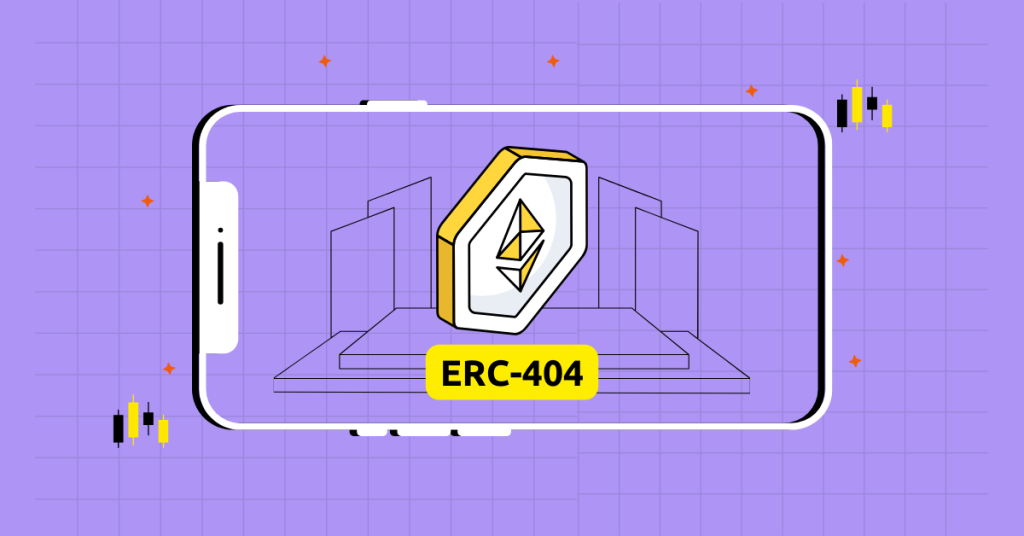ARTICLE AD BOX

The post What is ERC 404? Is It Worth Investing In? appeared first on Coinpedia Fintech News
So, what is this new hype about? A new token standard in the market, ERC-404, is launched in February 2024! With interoperability, better operations, and improved use cases, this new standard is all set to rule the crypto space. A few developers recently sparked the Ethereum space with this new token standard.
But what exactly is ERC-404? The Ethereum network has two prominent token standards, namely ERC-20 and ERC-721. Named after the popular website error code, ERC-404 is an unofficial Ethereum standard built by the Pandora team. It combines the usability of fungible tokens with non-fungible tokens to make a semi-fungible token.
Pandora, the first token built on the ERC 404 token standard, has a market capitalization of $176,321,562. With a 24-hour trading volume of $24,535,317 and an average price of $17,485.16, it draws much interest from investors and traders alike.
However, it is worth noting that the token’s price has experienced considerable volatility post-debut. On February 9, Pandora’s market cap peaked, with its total value exceeding the $300 million threshold and a trading volume of $71,542,503.
In this report by Coinpedia, we have compiled all the information related to ERC 404. Let’s delve into it as the basics of ERC 404 unfold step-by-step!
Introduction
As mentioned earlier, the Ethereum network has two significant token standards, ERC-20 and ERC-721. ERC-20 token standard is for fungible tokens, which function like digital cash. ERC-721 token standard is for the non-fungible tokens or NFTs. These two standards have operated in isolation, solving two different purposes. However, a group of developers decided to work on this system and change it!
Recently, they have introduced a new standard! It still fits in the category of unofficial and experimental since the authenticity test is yet not cleared by ERC-404. ERC-404 is named after the popular website error lingo. The token standard works by linking every issued token to an NFT. If less than one token is purchased, the NFT linked to the token is burnt. Adding more fractions would automatically mint another NFT when the fraction of the token is whole. However, the process comes at the cost of gas efficiency.
In this new system, traders can buy and sell NFTs as usual or sell parts of them as tokens. Despite being an “ERC” token standard, it has to undergo the typical vetting process defined for all ERC standard tokens. The process includes submitting improvement proposals (EIPs) and requests for comment phase (ERC). It is done to ensure that Ethereum upgrades are thoroughly tested and reviewed by the community. Since it has to undergo the required quality check, it can be exploited by the bad players around. Let us see if it passes the quality check or not!
All About ERC 404
- The ERC 404 token standard combines the ERC-20 and ERC-721 token standards. Thus, it is the best of the worlds!
- ERC-20 caters to crypto assets (fungible tokens) and ERC-721 deals with NFTs. ERC-404 is a semi-fungible token standard.
- “Crtl” and “Acme” have created this new Ethereum based token standard.
- It is made with an aim to offer enhanced functionality and flexibility for digital assets.
- The market cap of ERC-404 tokens has seen a decline in the second week of February, after recording meteoric gains in the previous week.
- On February 12, sharp declines were seen in the price of popular tokens built on the unofficial Ethereum token standard. For example, PANDORA, the first and most popular token built on the standard at one point, fell as much as 24% from highs of around $24,000 on Sunday, February 11, to below the $15,000 price point.
- According to data as of February 13, the total trading volume of Pandora reached an impressive 73,024 ETH, equivalent to approximately $190 million.
- On February 14, Pandora, an experimental hybrid token, experienced a surge in trading volume since its deployment on February 2. Within just one week, the token’s fully diluted valuation soared to over $320 million, making it one of the most talked-about projects in the crypto space.
- Notably, this volume includes transactions on both decentralized exchanges (DEXs) for ERC20 tokens and NFT marketplaces for ERC721 tokens.
- Other popular ERC-404 tokens are DeFrogs, Rug, Monarch, Crystal and many more.
Key Features of ERC-404
- Interoperability: ERC-404 hybrids are designed to work seamlessly across various platforms and ecosystems, breaking down barriers between different digital prospects. Since it is a combination of ERC-20 and ERC-721, it can be called a semi-fungible token standard, operating seamlessly on both principles.
- Enhanced Security: With advanced security protocols, ERC-404 reduces the risk of fraud and ensures that your digital assets are safer than before.
- Flexible Ownership Methods: This standard introduces more pronounced ownership possibilities, including fractional ownership, to cater to a broader range of use cases and not be limited to only a few.
- Greater Sustainability : ERC-404 includes mechanisms aimed at reducing the environmental impact of NFT transactions, aligning with growing concerns over blockchain sustainability.
- Fractionalized NFTs: Imagine owning a painting of a rare, digital Mona Lisa. Rather than one person owning the entire NFT, ERC-404 allows multiple people to own a share of this digital marvel. This fractional control isn’t just a novelty; it paves the way for more democratic access to high-value digital assets and opens up unique possibilities for how we interact with art, collectibles, and even real estate in the digital arena.
- Broader utility is allowed in digital asset management!
- Native Liquidity: Unlike conventional NFTs, these tokens integrate built-in liquidity mechanisms, facilitating smoother trading and fractional ownership.
- Programmable Scarcity: The token supply can dynamically adjust through codes, providing opportunities for innovative tokenomics models and adaptive scarcity.
So How Does ERC-404 Work?
- ERC-404 works by linking every issued token to an NFT! It acts as a source of verification of the token’s state and ownership. The NFT can have a base unit, which is the minimum amount of tokens that can be transferred or exchanged.
- If the base unit is 1000, then the token can be divided into 1000 fractions, each representing 1% of the NFT.
- The token can also have a total supply, which marks the maximum number of tokens that can be issued for the NFT.
- The ERC-404 standard uses a burn and mint mechanism. This is how one can transfer its fractional NFTs. In case we buy the full token, we get the linked NFT minted to our wallet. Selling a fraction of the token burns the linked NFT.
- However, if we buy enough fractions again, it burns a new NFT.
- The burn, mint mechanism forms the core of ERC-404 operations!
ERC-404 Projects
Though a recent case, ERC-404 already boasts of its multiple tokens like:
- Pandora: It is one of the first projects to adopt the ERC-404 token standard. It comprises 10,000 PANDORA ERC-20 tokens and 10,000 linked “Replicant” NFTs. Please note that a Replicant NFT is minted to your wallet if you purchase a PANDORA token on an exchange.
- DeFrogs: It is a collection of 10,000 Pepe-the-Frog-themed NFTs using a variant of the ERC-404 token standard, marked as the first ERC-404 PFP collection, which its creators claim is deflationary. While purchasing a DEFROGS token on Uniswap, buyers not only acquire the token but also receive a DeFrogs NFT through a mint contract.
- Monkees: Another popular PFP collection using the ERC-404 token standard, Monkees consists of 100 NFTs with ten attributes and six traits.
The Current Scenario
February 5, 2024, marked the launch of the first-ever ERC-404 token, Pandora ($PANDORA). Since then it has seen a lot of ups and downs. The market cap of the token nears $180 million. Let us look at other interesting facts:
- As per the recent CoinGecko data, ERC-404 currently has a market capitalization of $176,321,562. With a 24-hour trading volume of $24,535,317 and an average price of $17,485.16, it continues to draw significant interest from both investors and traders alike.
- It is worth noting the token’s price has experienced considerable volatility post-debut. On February 9, Pandora’s market cap reached an impressive high, with its total value exceeding the $300 million threshold and a trading volume of $71,542,503.
Source: CoinGecko
- DeFrogs ($DEFROGS), Rug ($RUG), Monarch ($MNRCH), and Froggy Friends ($TADPOLE) added to the list of ERC-404 tokens.
- DeFrogs shines with a present rate of $723.05 per token and a cumulative market capitalization of $7,689,095. Rug is marked at $265.62, boasting an aggregate market worth of $2,648,135.
- Monarch is priced at $102.11, valuing the company at $935,948. Froggy Friends, on the other hand, is being snatched up for a reasonable $54.29 each, with its 32.7% value increase suggesting positive prospects.
Source: CoinGecko , Date: February 14, 2024
Conclusion
The emergence of ERC-404 has ushered in a mix of emotions by the traders. Being widely accepted in a very short period, ERC 404 is already seeing rivals! A comparable concept known as Divisible NFT (DN404) soon arrived, boasting a “revitalized” approach. Amidst the rivalry with DN404, the demand for streamlined coding to mitigate the rising transaction costs associated with ERC-404 is quite critical. It needs to beat it to overcome the challenge!
Despite the hurdles, the advent of these new tokens marks a pivotal moment in the NFT sector! However, due to its unofficial nature, many NFT platforms do not support it. The arrival of these tokens could lead to more unaudited token standards going to market too, which could be another risk. The tokens saw a steep rise in demand in a very short while, suggesting a lot of scope for them in future.
.png)
 10 months ago
2
10 months ago
2








 English (US)
English (US)